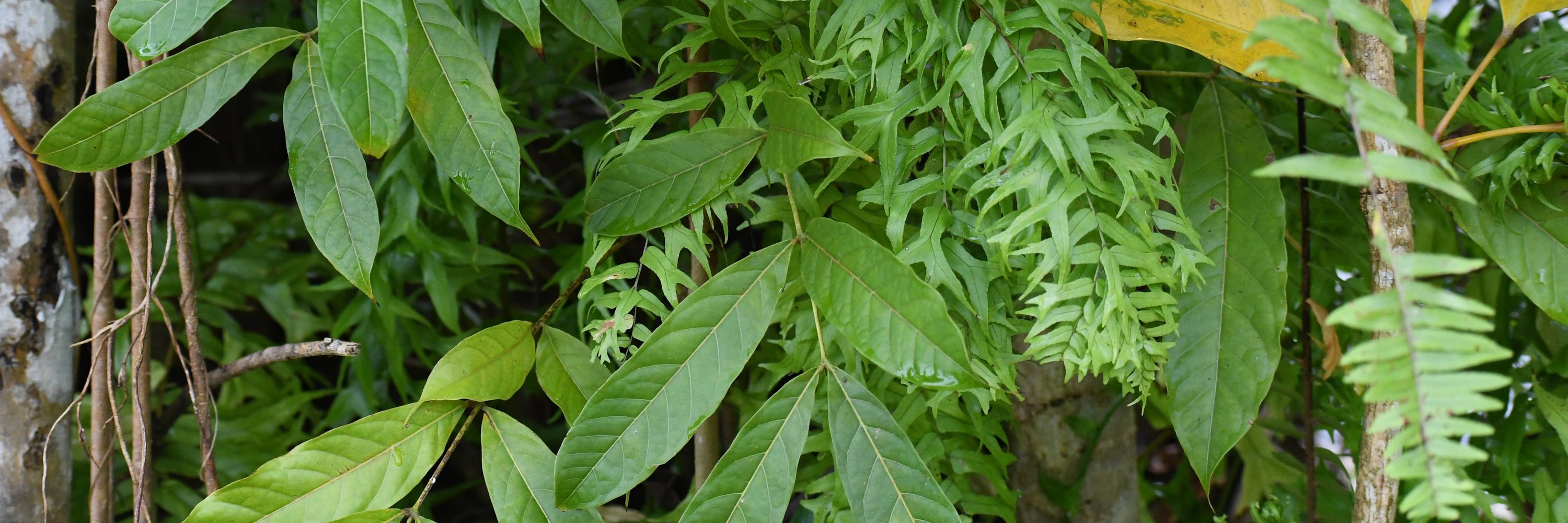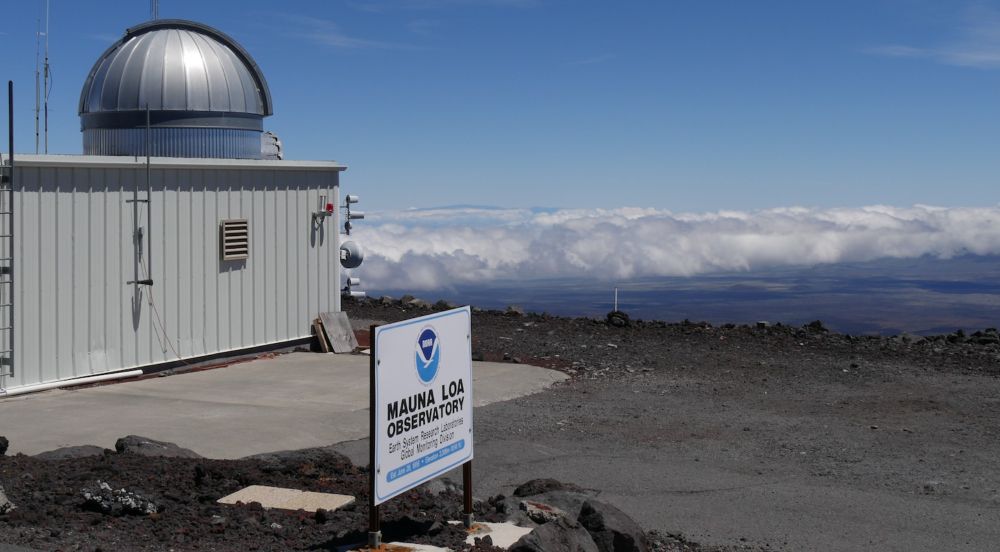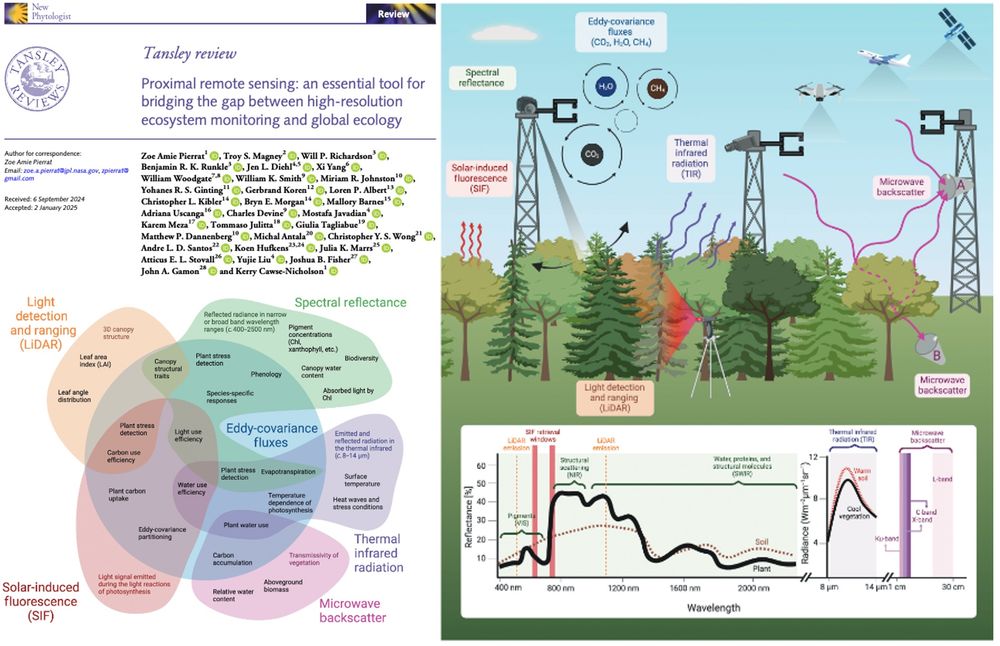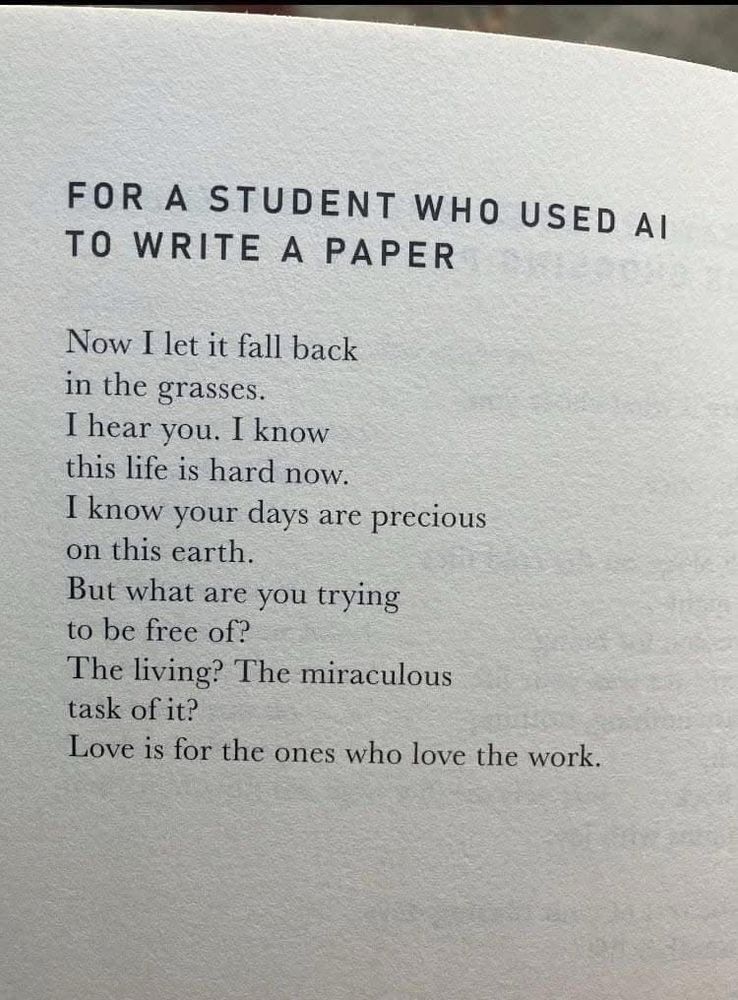
Christopher Kibler
@kiblerchris.bsky.social
Earth system scientist at University of California, Santa Barbara. I mostly think about fires, droughts, evapotranspiration, and carbon cycling.
Very interesting paper. I have thought about running this experiment using a computer model. Really cool to see it demonstrated from field measurements.
This should have important implications for photosynthesis and respiration rates. Increased leaf temperature could offset carbon gains from eCO2.
This should have important implications for photosynthesis and respiration rates. Increased leaf temperature could offset carbon gains from eCO2.
Very pleased to be part of this super cool new paper led by William Hagan Brown in @globalchangebio.bsky.social looking at the impact of elevated CO2 on canopy temperatures in an oak woodland at the BIFor-FACE experiment
dx.doi.org/10.1111/gcb....
dx.doi.org/10.1111/gcb....

Elevated CO2 Increases the Canopy Temperature of Mature Quercus robur (Pedunculate Oak)
We investigated the impact of high atmospheric CO2, similar to that predicted for 2050, on tree canopy temperature dynamics of mature pedunculate oak using long-term, high-frequency thermal infrared ...
dx.doi.org
November 6, 2025 at 1:25 AM
Very interesting paper. I have thought about running this experiment using a computer model. Really cool to see it demonstrated from field measurements.
This should have important implications for photosynthesis and respiration rates. Increased leaf temperature could offset carbon gains from eCO2.
This should have important implications for photosynthesis and respiration rates. Increased leaf temperature could offset carbon gains from eCO2.
Reposted by Christopher Kibler
Save the date! 47th New Phytologist Symposium on 'Extreme Heat: extending the thermal limits of life'. Explore how extreme heat affects plants that underpin ecosystem productivity.
2-5 June 2026, Cordoba, Spain.
@newphyt.bsky.social
www.newphytologist.org/events/47-nps
2-5 June 2026, Cordoba, Spain.
@newphyt.bsky.social
www.newphytologist.org/events/47-nps

Extreme Heat: extending the thermal limits of life
www.newphytologist.org
November 3, 2025 at 6:52 AM
Save the date! 47th New Phytologist Symposium on 'Extreme Heat: extending the thermal limits of life'. Explore how extreme heat affects plants that underpin ecosystem productivity.
2-5 June 2026, Cordoba, Spain.
@newphyt.bsky.social
www.newphytologist.org/events/47-nps
2-5 June 2026, Cordoba, Spain.
@newphyt.bsky.social
www.newphytologist.org/events/47-nps
Reposted by Christopher Kibler
Attention Bluesky - @noupside.bsky.social & @rachelkleinfeld.bsky.social say,
"To avoid irrelevance when they are needed most, experts & nonpartisan analysts must rethink not just their channels of communication but also their theory of influence."
Do you agree? What change is most important? 🧵🧪
"To avoid irrelevance when they are needed most, experts & nonpartisan analysts must rethink not just their channels of communication but also their theory of influence."
Do you agree? What change is most important? 🧵🧪
People like me, who have spent a lifetime building credibility, face a real problem when most Americans no longer trust institutions. We need to face the new terms of trust for our expertise to matter. Renée DiResta@noUpside & I wrote this to explain why & how: carnegieendowment.org/research/202...

For Expertise to Matter, Nonpartisan Institutions Need New Communications Strategies
To avoid irrelevance when they are needed most, experts and nonpartisan analysts must rethink not just their channels of communication but also their theory of influence.
carnegieendowment.org
September 29, 2025 at 6:52 PM
Attention Bluesky - @noupside.bsky.social & @rachelkleinfeld.bsky.social say,
"To avoid irrelevance when they are needed most, experts & nonpartisan analysts must rethink not just their channels of communication but also their theory of influence."
Do you agree? What change is most important? 🧵🧪
"To avoid irrelevance when they are needed most, experts & nonpartisan analysts must rethink not just their channels of communication but also their theory of influence."
Do you agree? What change is most important? 🧵🧪
How guaranteed are the ESA page fee grants if I apply? I want to submit, but don't really have money for publication fees. @esajournals.bsky.social
September 3, 2025 at 4:14 PM
How guaranteed are the ESA page fee grants if I apply? I want to submit, but don't really have money for publication fees. @esajournals.bsky.social
Oxford commas are important @nature.com

August 22, 2025 at 5:20 PM
Oxford commas are important @nature.com
Reposted by Christopher Kibler
"this product is good because it's like having a pocket full of PhDs" just suggests to me you've never actually been in a room with a bunch of experts on a topic.
You think you're going to come away with a quick, simple, easy-to-digest summary of their expertise? Think again.
You think you're going to come away with a quick, simple, easy-to-digest summary of their expertise? Think again.
August 7, 2025 at 8:30 PM
"this product is good because it's like having a pocket full of PhDs" just suggests to me you've never actually been in a room with a bunch of experts on a topic.
You think you're going to come away with a quick, simple, easy-to-digest summary of their expertise? Think again.
You think you're going to come away with a quick, simple, easy-to-digest summary of their expertise? Think again.
Farthest I've been:
N: Edinburgh (55.9° N)
E: Shanghai (121.4° E)
S: San Juan, PR (18.4° N)
W: Kona, HI (156° W)
N: Edinburgh (55.9° N)
E: Shanghai (121.4° E)
S: San Juan, PR (18.4° N)
W: Kona, HI (156° W)
Farthest I’ve been:
N: Stockholm (59.3° N— had to look up whether it was higher up than Inverness)
E: Dunedin NZ (170.5° E)
S: Also Dunedin NZ (45.9° S)
W: Victoria BC (123.3° W)
N: Stockholm (59.3° N— had to look up whether it was higher up than Inverness)
E: Dunedin NZ (170.5° E)
S: Also Dunedin NZ (45.9° S)
W: Victoria BC (123.3° W)
Farthest I've been (this is going to be weak):
N: London
E: Vienna
S: Oaxaca
W: Seattle
N: London
E: Vienna
S: Oaxaca
W: Seattle
August 7, 2025 at 6:51 PM
Farthest I've been:
N: Edinburgh (55.9° N)
E: Shanghai (121.4° E)
S: San Juan, PR (18.4° N)
W: Kona, HI (156° W)
N: Edinburgh (55.9° N)
E: Shanghai (121.4° E)
S: San Juan, PR (18.4° N)
W: Kona, HI (156° W)
My take: Science gives us knowledge but not wisdom. Wisdom = knowledge + values.
So science can tell you what's true, but not what's important. Your values tell you what's important, but those are far more subjective. Your wisdom is your combination of what is true and what you think is important.
So science can tell you what's true, but not what's important. Your values tell you what's important, but those are far more subjective. Your wisdom is your combination of what is true and what you think is important.
I find plenty to agree with in this paper, but also plenty to 🤔. It seems largely couched in terms of the "public understanding vs public engagement" debate that happened in the late 1990s. Which is fine, but are we still at that stage of the debate?
www.pnas.org/doi/10.1073/...
www.pnas.org/doi/10.1073/...

An agenda for science communication research and practice | PNAS
Science should not unilaterally dictate individuals’ decisions or public policies.
Yet, it provides a vital source of information for societies and...
www.pnas.org
August 7, 2025 at 4:38 PM
My take: Science gives us knowledge but not wisdom. Wisdom = knowledge + values.
So science can tell you what's true, but not what's important. Your values tell you what's important, but those are far more subjective. Your wisdom is your combination of what is true and what you think is important.
So science can tell you what's true, but not what's important. Your values tell you what's important, but those are far more subjective. Your wisdom is your combination of what is true and what you think is important.
Today I learned that Python alphabetizes based on Unicode values, where all capital letters are before all lowercase letters. So "Z" will be sorted before "e".
August 6, 2025 at 5:53 PM
Today I learned that Python alphabetizes based on Unicode values, where all capital letters are before all lowercase letters. So "Z" will be sorted before "e".
Only a couple more days to submit to our #AGU25 session on Conservation Ecohydrology! It's a very fun session with lots of interesting applied ecohydrology studies. 🌲💧🚜
agu.confex.com/agu/agu25/pr...
agu.confex.com/agu/agu25/pr...
Conservation Ecohydrology
In a world projected to become hotter and, in many places, drier over the next century, successful conservation strategies require a better understanding of the interactions between flora, fauna, clim...
agu.confex.com
July 28, 2025 at 4:03 PM
Only a couple more days to submit to our #AGU25 session on Conservation Ecohydrology! It's a very fun session with lots of interesting applied ecohydrology studies. 🌲💧🚜
agu.confex.com/agu/agu25/pr...
agu.confex.com/agu/agu25/pr...
At some point, I wonder if it makes sense to have newspapers and other longform media outlets supported by endowments in the same way that foundations and universities are.
I would add to this that traditional newsrooms employ lots of people to do forms of journalism that have value but are unlikely to be profitable as standalone products.
As more journalists are driven out of their jobs, I keep hearing this drumbeat of "it's ok -- they can start their own newsletter or publication." Some can. But becoming your own business is a huge job, and will eliminate many talented reporters from the public sphere. Here's why. (1/5)
July 11, 2025 at 12:18 AM
At some point, I wonder if it makes sense to have newspapers and other longform media outlets supported by endowments in the same way that foundations and universities are.
Please consider submitting to our #AGU25 session Conservation Ecohydrology (H053).
There are always interesting presentations on fun and novel applications of ecohydrology methods. Past presentations have covered everything from beavers to gold mines to power plants.
agu.confex.com/agu/agu25/pr...
There are always interesting presentations on fun and novel applications of ecohydrology methods. Past presentations have covered everything from beavers to gold mines to power plants.
agu.confex.com/agu/agu25/pr...
Conservation Ecohydrology
In a world projected to become hotter and, in many places, drier over the next century, successful conservation strategies require a better understanding of the interactions between flora, fauna, clim...
agu.confex.com
July 10, 2025 at 6:47 PM
Please consider submitting to our #AGU25 session Conservation Ecohydrology (H053).
There are always interesting presentations on fun and novel applications of ecohydrology methods. Past presentations have covered everything from beavers to gold mines to power plants.
agu.confex.com/agu/agu25/pr...
There are always interesting presentations on fun and novel applications of ecohydrology methods. Past presentations have covered everything from beavers to gold mines to power plants.
agu.confex.com/agu/agu25/pr...
Excited to be a part of this effort!
🌿 New paper out in ESA Ecosphere! We present the SHIFT campaign: a first-of-its-kind sub-seasonal VSWIR hyperspectral dataset 🌎 ➡️ doi.org/10.1002/ecs2... A goldmine for land surface models — tracking stress, traits, and phenology in unprecedented detail. #SHIFTcampaign #NASA



March 25, 2025 at 1:19 AM
Excited to be a part of this effort!
I believe this is the "don't look up" approach to environmental policy.
New: A NOAA lab in Hawaii that is connected to the longest-running observation of global greenhouse gas concentrations is slated for closure in August, according to a list of lease terminations Democratic members of Congress shared with @washingtonpost.com.

Trump moves to close government lab that tracks planet-warming pollution
The lab is connected to the Mauna Loa Observatory, where scientists gather data to produce the Keeling Curve, a chart on the daily status of atmospheric carbon dioxide concentrations.
www.washingtonpost.com
March 14, 2025 at 7:02 PM
I believe this is the "don't look up" approach to environmental policy.
Just found the greatest scientific article of all time

March 3, 2025 at 11:00 PM
Just found the greatest scientific article of all time
Reposted by Christopher Kibler
Thermal infrared remote sensing, both from space and near Earth’s surface, is unlocking new ways to study ecosystems, from individual leaves to entire landscapes, write @mostafaj.bsky.social, @stephpau.bsky.social, and colleagues. eos.org/science-upda...

Sensing Potential, Scientists Refine Thermal Imaging of Ecosystems - Eos
At a recent “bake-off,” researchers judged thermal infrared cameras and developed guidelines for their consistent use in studying vegetation temperatures, which illuminate vital ecosystem processes.
eos.org
February 7, 2025 at 2:04 PM
Thermal infrared remote sensing, both from space and near Earth’s surface, is unlocking new ways to study ecosystems, from individual leaves to entire landscapes, write @mostafaj.bsky.social, @stephpau.bsky.social, and colleagues. eos.org/science-upda...
It was great to be a part of this effort. I'm really excited for the new infrastructure and protocols that are going to help standardize and scale proximal remote sensing over the next few years.
New Tansley review paper from Zoe Pierrat & friends in @newphyt.bsky.social linking proximal remote sensing with ecosystem fluxes!
Synergies and best practices for hyperspectral reflectance, SIF, thermal, microwave and lidar 🌈🌲🗼🛰️🧪
nph.onlinelibrary.wiley.com/doi/10.1111/...
Synergies and best practices for hyperspectral reflectance, SIF, thermal, microwave and lidar 🌈🌲🗼🛰️🧪
nph.onlinelibrary.wiley.com/doi/10.1111/...

January 23, 2025 at 7:11 PM
It was great to be a part of this effort. I'm really excited for the new infrastructure and protocols that are going to help standardize and scale proximal remote sensing over the next few years.
During COVID times, I had charts like this for my asynchronous lectures. They looked similar, although the initial drop off wasn't as steep.
Very few people see a full video on YouTube apparently, even if it lasts just 10-15 minutes.

January 4, 2025 at 6:50 PM
During COVID times, I had charts like this for my asynchronous lectures. They looked similar, although the initial drop off wasn't as steep.
Reposted by Christopher Kibler
Each of us contributes incrementally to a future we may never see. If it is in our lifetime, if our science, or our contribution, is part of a practical solution, it will likely be one sentence in a vast tome with contributions from thousands of authors across dozens of (not just science) fields.
December 22, 2024 at 3:10 PM
Each of us contributes incrementally to a future we may never see. If it is in our lifetime, if our science, or our contribution, is part of a practical solution, it will likely be one sentence in a vast tome with contributions from thousands of authors across dozens of (not just science) fields.
The scar of the 2020 Creek Fire is hard to miss when you're driving around Shaver Lake, CA. Lots of stand replacing burns as far as the eye can see. #FireScarFriday

December 6, 2024 at 7:58 PM
The scar of the 2020 Creek Fire is hard to miss when you're driving around Shaver Lake, CA. Lots of stand replacing burns as far as the eye can see. #FireScarFriday
Reposted by Christopher Kibler
Poem by Joseph Fasano

November 29, 2024 at 8:57 PM
Poem by Joseph Fasano
This is a great approach. I think more climate change communication needs to emphasize that it is caused by simple, observable processes that emerge from basic physical principles. Too often, we get caught up in the nuances of empirical methods that are not necessary to establish the basic facts.
When talking about climate change I’ve started to incorporate a quick physical explanation on the basics before getting into it, like “CO2, a molecule that absorbs heat like a black t-shirt,…” or “carbon dioxide, which is opaque to infrared light,…”
November 23, 2024 at 5:55 AM
This is a great approach. I think more climate change communication needs to emphasize that it is caused by simple, observable processes that emerge from basic physical principles. Too often, we get caught up in the nuances of empirical methods that are not necessary to establish the basic facts.



